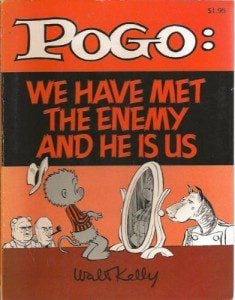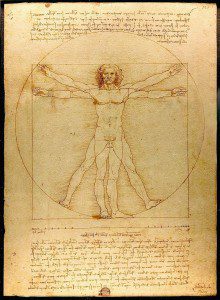Is Evangelicalism a Secularizing Force?
Originally Published on Patheos, January 13, 2016

I’ve thought long and hard about secularism and as I’ve done so I’ve come to wonder whether or not I am an unwitting agent of it.
I’m not thinking about that hobby horse of preachers, “practical atheism”. According to that thumbscrew our moral failures justify unbelief. It’s because I don’t give to the poor, or recycle, or whatever-the-thing-is-that-I’m-supposed-to-do-according-to-the-preacher, that people don’t believe in God.
I don’t really think I have that much power over what people believe. Instead I’m going a little deeper, down to the level of our presuppositions.
Presuppositions are difficult to think about because they are the very ideas we use to think in the first place. That’s why they are so powerful, not only do they stay out of view, they color the way we see other things.
Nominalism
When I was first introduced to Nominalism back when I took Introduction to Medieval Philosophy as an undergraduate, it made me vaguely uneasy. It didn’t appeal to me, but I didn’t rightly know why. I came to see over the years, with a growing sense of self-loathing, that I was a Nominalist. I’ve been working double-overtime to change that. It’s been doubly difficult because Evangelicalism is pretty much Christian Nominalism for the Everyman.
Most Evangelicals don’t have any idea what-in-the-world I’m talking about when I point this out. For Evangelicals a Nominalist is what those Catholics who only go to church at Christmas and Easter are. You know, they’re Christian in name only.
But Nominalism in philosophy basically says that’s the case for everything. A tree is a tree in name only, a man is a man in name only, and so on. The idea is the names we use to classify things don’t really refer to anything real.
Initially it may be difficult to see how this connects to secularism, so let me fill in some if the intervening space.
We’re all literalists now
To an older way of thinking, something called Realism, the world is a poem. It’s a meaningful place; it refers to something.
The word poem means “to make”, from the Greek, “poiein”. Poems must be interpreted, of course, and getting the meaning right can be tricky. But no one would say a poem is meaningless because people can’t agree to its meaning. That’s because poems are written by people and they refer to things.
Medieval Nominalists would have agreed with that. As a point of fact, they were concerned that God should be free to say whatever he pleased. They were reacting to the notion that God had to make the world the way it is by a force of necessity. So to free God, they had to cut the cords that tied the world to him. That freed him in our minds, but it has also left the world adrift.
Now, because the world doesn’t necessarily refer to God, the world can only refer to itself. And taken to an extreme, every particular thing in the world can only refer to itself. Why, even calling a leaf “a leaf” is stereotyping. Each leaf should have its own name. To call all leaves, “leaves” is almost unjust.
This is why we’re all literalists now. Even if we don’t go as far as giving a unique name to every individual leaf, we tend to think that the things in the world refer only to themselves. They don’t point to anything else, except, that is, by some arbitrary act by some person. And depending on what he’s talking about he can be said to be “creative” or “bigoted”.
The Secular Christian?
What Nominalism did for secularism is denature the world by cutting its meaning off from its creator. Instead of seeing a world of intrinsic meaning, most people, evangelicals included, think of it as neutral, just so much sweet cream to which we can add whatever flavor we’d like.
The influence on Christianity has been enormous, and Evangelicalism is one of the best places to see it. I’m going to limit myself to three of the more characteristic features of Evangelicalism to show what I mean.
A Personal Relationship with Jesus

http://www.amazon.com/Sallman-Christ-at-Hearts-Door/dp/B000PS2E8I
Nominalism has created a problem for everyone, not just Christians. In the world of philosophy the challenge was met by retreating into the self. Descartes’ famous, “I think therefore I am” established a new basis for truth and meaning. It wasn’t as subjective as it may sound, Descartes worked overtime to build a mental causeway back to the external world. But the point is truth and meaning were not encountered out in the world, they were discovered in the mind.
Evangelicals do much the same thing. Jesus is someone who is known inwardly, in the heart. Think of that old standard, “He Lives” with the line: “You ask me how I know he lives, he lives within my heart!”
That’s not how the Apostles put it. But now the idea that you would appeal to the witness of the Apostles to establish the truth of the resurrection seems unspiritual to many Evangelicals. And many can’t even see Christ in the sacraments. But it all began with downgrading the world from a poem to meaningless stuff. Now meaning only lives in our hearts.
Artless Bible Study
For many Evangelicals you must choose between facts and metaphors. Because Evangelicals don’t think that creation itself is a kind of metaphor, anytime someone brings up the idea that something in scripture may be a metaphor it is assumed that he is undermining biblical authority, you know, like liberals do.
(It’s true that liberals undermine biblical authority; but the problem with liberals is not that they see metaphors in scripture, their problem is the locate metaphors solely in the human mind).
But if creation itself is a kind of metaphor, then historical facts can refer to bigger things. Quick example: Jesus did indeed walk on water, but that says more than, “Hey, look at what I can do!” The sea in the Bible refers to death and judgment as well as to itself. So, when Jesus walked on the sea he was saying, “I am greater than death.”
Because Evangelicals can’t read the poetry of creation, they can’t read the poetry of the Bible. We’re artless interpreters.
Instrumentalism
Last of all, at least for today, Evangelicals are guilty of crude and artless uses of creation. Our music tends to be sappy and didactic. Our architecture is destined for the wrecking ball. And the reason this is so is we don’t see the meaning in our materials.
In all my years of pastoral ministry I’ve never had a person say to me, “How does music express the glory of God?” I’ve had people say things like, “We need a band in order to appeal to young people.” And I’ve never had anyone even remotely concerned with whether medium density fiber board says the same thing as quarter-sawn red oak. I’ve had people say things like, “It doesn’t matter what we build it out of, so long as our hearts are in the right place.”
Really? That’s all that matters? We need to get Real, to get back to the Real world and Real meanings. More on that another time.
Nominalism and the Law of Unintended Consequences
Originally published on Patheos January 15, 2016

I like antibiotics and air-conditioning, and I’d like to keep them.
Many knowledgable people agree that we probably wouldn’t have either–or have many other worthwhile things–without Nominalism. I agree.
When I first heard that Nominalism maybe the culprit behind the disenchantment of the world, it seemed right to finger it for blame. But when I heard secularists give credit to Occam’s razor for contributing to the rise of science as we know it, the last of my reservations fell away.
But it left me with a problem, the one I’m sure you can see from what I said a moment ago. Science has made the material conditions of our lives better in many ways even as spiritual conditions have gotten worse. We now lead seemingly meaningless lives in conditions the ancients would have considered palatial.
Can we have it both ways? Or must we choose one or the other: either lives of ease amid plenty with nothing to live for, or spiritually rich lives that also tend to be brutish and short?
Christian defenders of Nominalism
Some folk defend the Nominalists by pointing out that they shouldn’t be blamed for unintended consequences; Nominalists had good intentions. They weren’t out to bleach the world of meaning.
I sort of agree with that. The consequences, both bad (the death of meaning), and good (science) were unintended. But that misses the problem. Here’s the problem: What now?
One way to have it both ways is by privatizing meaning. (That’s self-defeating because it gives away the stuff that makes selves possible.) Fundamentalism is another way to deal with the problem. It superimposes a heteronomous Word upon the stuff of life and culture. It can’t help but come across as alien and oppressive though. (Fundamentalism seems to produce as many atheists as believers.)
Two analogies that I find helpful (I coined them both…feel free to use them if you’d like.)
Because science is a quest for knowledge without reference to us, it necessarily loses a sense of human scale as our instruments of measurement grow more powerful. But meaning is all bound up with human scale. Meaning is occupied with the question, “What is the good life?” And since we live our lives in bodies, meaning must be discovered at the level of human scale. If you can accept this, then these two analogies may appeal to you.
Proper viewing distance

When you go to an art gallery the works are situated so as to facilitate proper viewing distance. This is tacit knowledge, embedded into the conditions for viewing. You don’t need to think about it, the thinking was done for you.
If you are too far away from a work, you can’t receive it properly, the meaning is lost with the increase in distance. The same goes for getting too close.
We are placed in the world with faculties that are appropriate to our place in it. Our senses serve our lives, not only by helping us survive, but by helping us to live meaningfully. When we pull back or get too close, we can lose our orientation and lose a sense of meaning.
There has been a revival of interest in human scale in architecture and tool making. (New Urbanism and ergonomics are what I’m thinking about.) But this point is larger, it presumes that our bodies and our universe were made for each other.
Does this make science, with its out-sized instruments for measuring the cosmos, somehow wrong? No. But we need to think about what we’re doing.
Artists know their media and they work with them knowledgeably, if not altogether consciously, to create works scaled to the embodied reception of those works. Science takes us into the realm of pigment mixing and brush making. It takes us into the world of meaning making. This can work itself out in two ways. We can either co-create–taking the forms already given by God and working harmoniously with them. Or we can attempt to overwrite those forms and dehumanize and deface the world.
How can we do science without doing the latter?
Science is basketball
If I were to run up to you and knock things out of your hand, or move back and forth laterally to keep you from getting to your goal, you’d probably think I was joking. But if I kept it up, you might call the police.
On the other hand, if you were to walk casually through a basketball game on your way somewhere and you got in the way of play, people on the court would consider you rude, and if the stakes were high (maybe there’s money on the line for the winning team), you might even get beat up. (Basketball is my sport of choice, but you can substitute your favorite if you’d like.)
Science is like basketball in this way. On the court of scientific study, rules apply that don’t apply off the court. Conversely, many of the rules that govern our lives and give them meaning are suspended. A scientist may study biochemistry all day long, but when he goes home he doesn’t treat his wife as though she were just a machine made of meat. She’s his wife and he should treat her as such. (If he were to attempt to fix electrodes to her skull at the dinner table it could lead to conflict.)
Now which is more real–biochemistry or the embodied life of a human being?
Every humane scientist knows the answer intuitively.